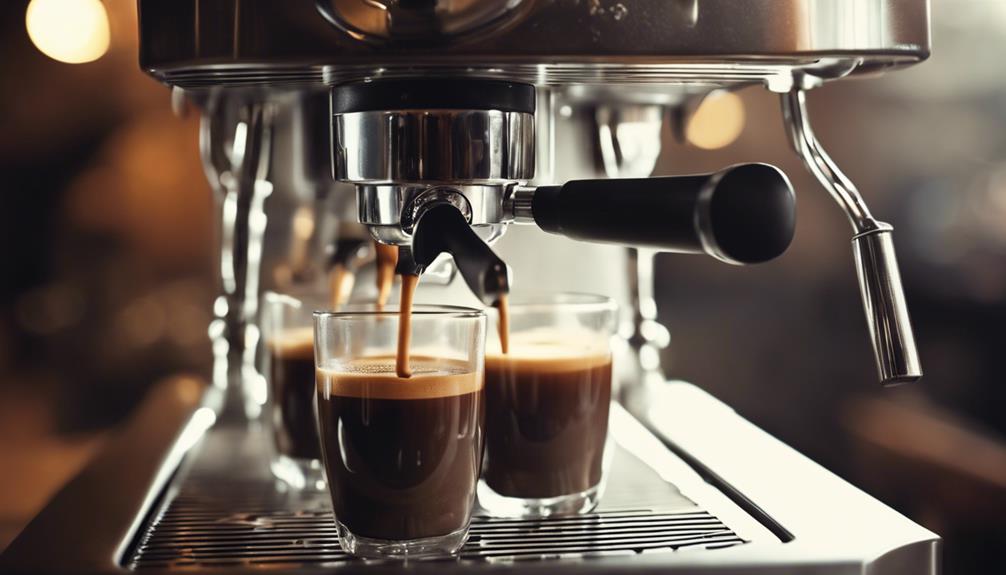Espresso machines can be noisy due to the high-pressure extraction process required to make strong espresso. The internal pump, which is responsible for creating this pressure, is located near the brewing action, making the noise more noticeable. The machine maintains about 9 bars of pressure to ensure the best flavor extraction, with vibrations from components like motors and pumps contributing to the overall sound. Turbulence during the brewing process, necessary for flavor extraction, generates rapid movements and collisions, resulting in loud noises. By understanding these factors, one can better appreciate the complex process of brewing espresso. For more insights into espresso machine noise generation, click here.
Key Takeaways
- Proximity of internal pump to brewing process amplifies noise.
- High-pressure extraction for espresso requires noisy operation.
- Vibrations from components like pumps contribute to loudness.
- Turbulence during brewing creates loud sounds for flavor extraction.
- Pump cycling noise, essential for extraction, impacts ambiance in quieter settings.
Internal Pump Operation
Internal pump operation greatly contributes to the loudness of espresso machines, especially due to the proximity of the pump to the brewing process. The machine pump plays an essential role in the extraction of espresso, but its location inside the machine results in heightened noise levels.
As the pump operates within the compact confines of the espresso maker, the sound it generates is amplified during the brewing process. This design choice, while important for creating high-pressure extraction necessary for espresso, also leads to increased noise output.
Compared to machines with external pumps, internal pump espresso machines tend to be louder due to the direct interaction of the pump with the brewing components. The close placement of the pump to the brewing mechanism inside the machine results in a noticeable increase in decibel levels during the coffee-making process.
This unique characteristic of internal pump espresso machines contributes significantly to their overall loudness.
High Pressure Extraction
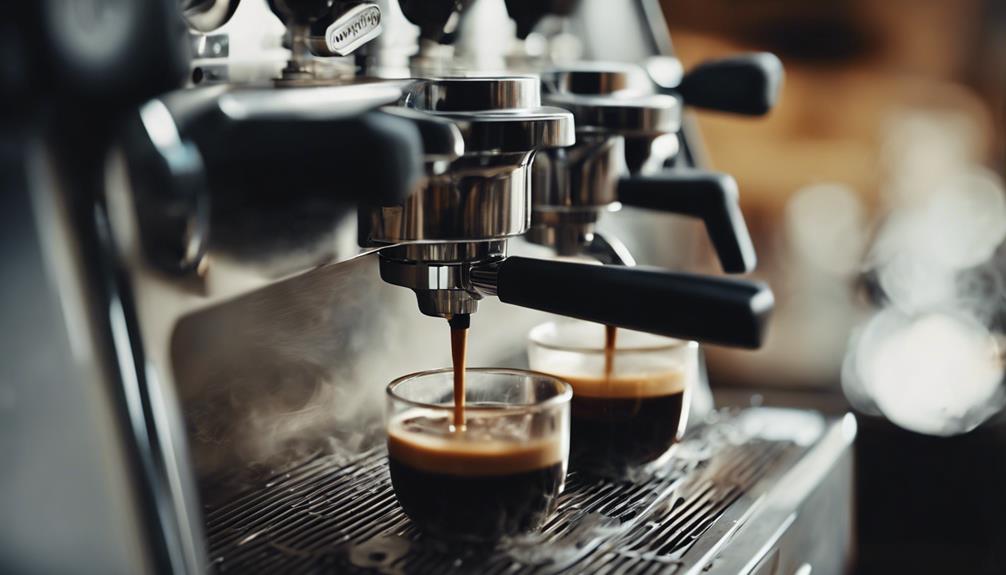
The high pressure required for the extraction process in espresso machines is typically around 9 bars during brewing. This pressure is necessary to extract flavors and aromas effectively from the coffee grounds, resulting in that rich and bold espresso you love.
When the pump in the espresso machine forces hot water through the compacted coffee grounds at such high pressures, it creates a loud noise. The noise level directly correlates with the high-pressure extraction method used to produce those perfect espresso shots.
If the pressure is too high, it can lead to a louder operation but also guarantees a more robust extraction process. So, the next time you hear your espresso machine making a racket, remember that it's all part of the precision needed to create that delightful cup of espresso.
Vibrations From Components
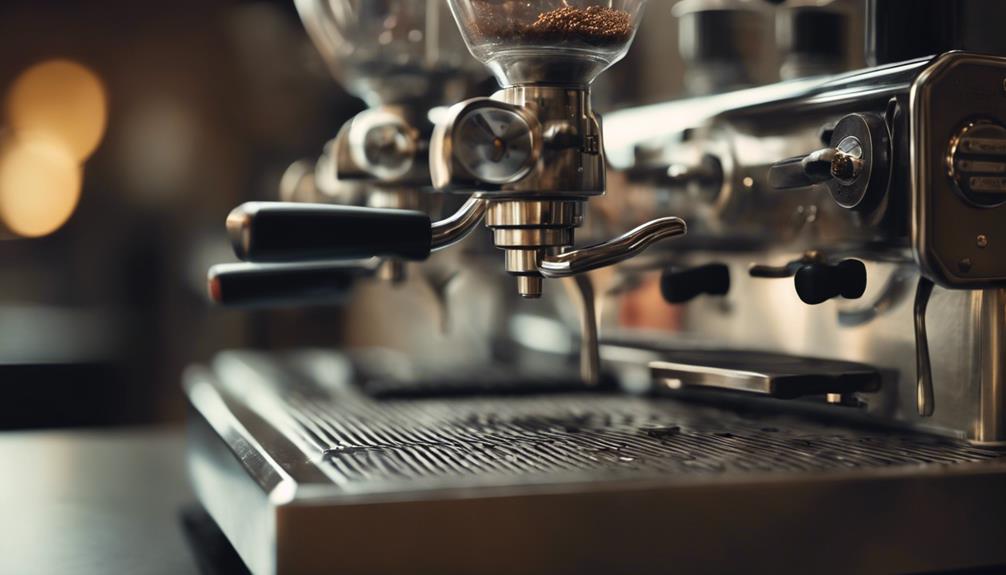
Vibrations from components like pumps and motors contribute greatly to the loudness of espresso machines. The internal mechanisms of espresso machines, particularly the pump responsible for generating high pressure, can produce vibrations that manifest as noise during operation.
These vibrations can be further exacerbated by loose or improperly mounted components, amplifying the overall noise levels. The interaction of moving parts, such as the pump mechanism, with other elements within the machine can also generate vibrations that translate into audible sounds.
To mitigate the noise output of espresso machines, it's essential to address and minimize these vibrations stemming from internal components. By ensuring that all components are securely fastened and properly aligned, the impact of vibrations can be reduced, leading to a quieter espresso machine overall.
Manufacturers often focus on optimizing the design and assembly of these components to lessen vibrations and create a more enjoyable user experience.
Turbulence During Brewing
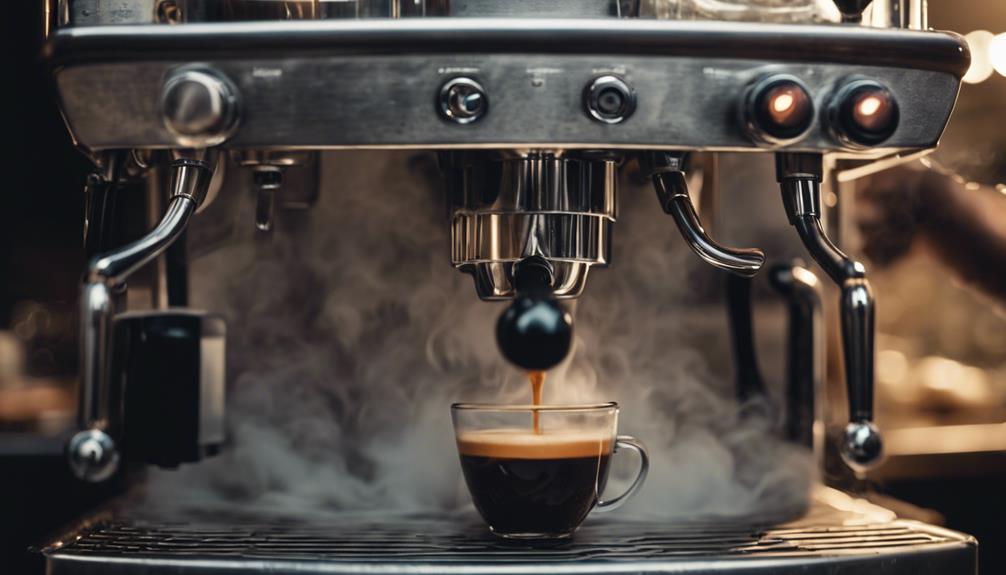
During the brewing process in espresso machines, turbulence arises as high-pressure water flows through the compacted coffee grounds, leading to intense mixing and agitation. This essential element in extracting the flavors and aromas from the coffee beans.
As the water forcefully interacts with the grounds, it creates a noisy environment due to the rapid movement and collision of particles. The turbulence helps break down the coffee grounds efficiently, ensuring a proper extraction of compounds that contribute to the rich taste of espresso.
However, this vigorous mixing process also generates the loud sounds often associated with espresso machines. Understanding the role of turbulence in brewing sheds light on why these machines can be so loud during operation.
It's this dynamic interaction between water and coffee that produces both the delicious espresso we enjoy and the noisy brewing process that accompanies it.
Pump Cycling Noise
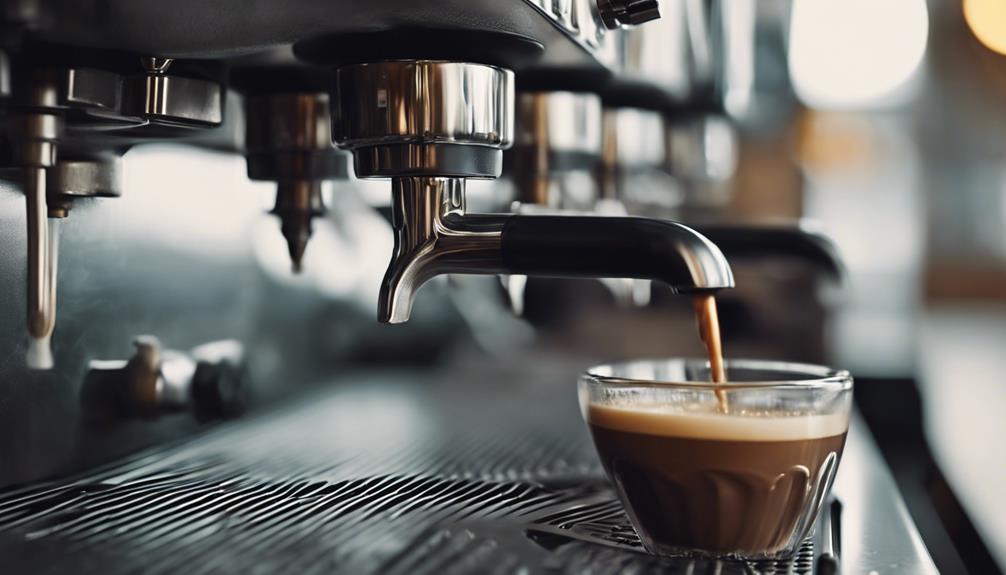
When an espresso machine is in operation, the pump cycling noise can be noticeable due to the constant changes in pressure as the pump works to maintain the ideal brewing conditions.
This noise, though essential for the extraction process, can impact the overall ambiance, especially in quieter settings.
Understanding how pump operation generates noise and its effects on the environment can help you manage and potentially reduce the noise level of your espresso machine.
Pump Operation Noise
Amidst the brewing process of espresso, the pump cycling noise, stemming from the pump's operation, plays a pivotal role in maintaining the necessary pressure for extracting the rich flavors of the coffee grounds.
The pump's operation in espresso machines can be quite noisy due to the cycling process required for brewing. This noise is a byproduct of the high-pressure pumps necessary for extracting the intense flavors present in espresso.
The cycling noise is a fundamental aspect of the espresso machine's functionality, as it creates the pressure needed to draw out the essence of the coffee grounds.
Embracing and understanding this characteristic sound is essential for appreciating the art and science behind brewing espresso.
Impact on Ambiance
The impact of pump cycling noise in espresso machines on the ambiance of a quiet setting can be quite significant. In a serene environment, such as a cozy coffee shop or a peaceful kitchen, the sound of the espresso machine's pump cycling can have a noticeable effect.
The rhythmic hum of the pump cycling can break the tranquility of the space, disrupting the peaceful atmosphere. Customers trying to enjoy a moment of relaxation may find the repetitive noise of the espresso machine distracting and intrusive.
The loudness of the pump cycling can overshadow conversations or quiet background music, affecting the overall ambiance of the place.
When considering the ambiance of a space where an espresso machine is used, managing the pump cycling noise is essential. By minimizing the disruption caused by the machine's operation, it's possible to create a more pleasant and enjoyable environment for customers to savor their coffee experience.
Casing Amplification
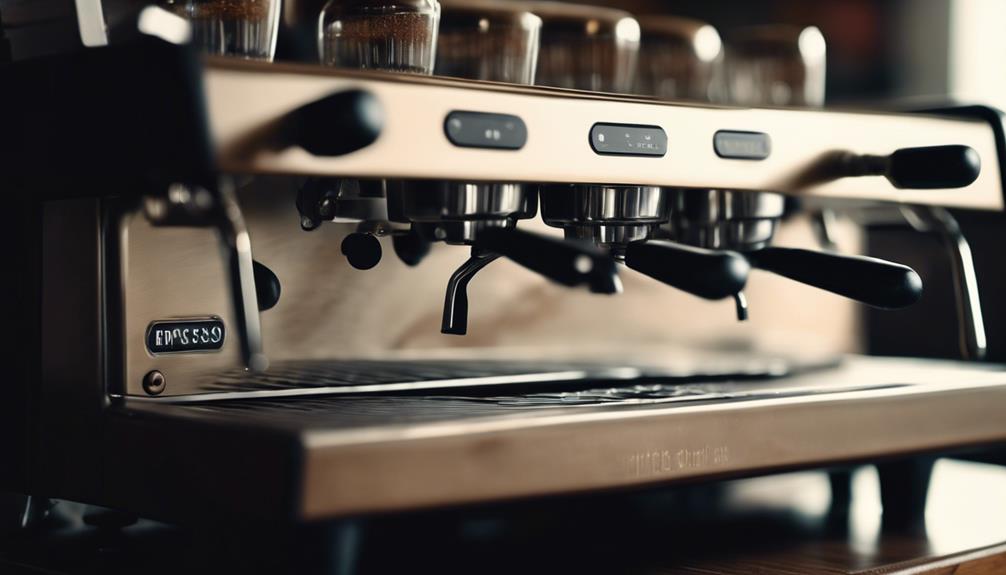
The design of an espresso machine's casing can greatly impact the noise it produces.
Insulation options play an important role in reducing the noise amplified by the casing.
The materials used in the casing, such as plastic or metal, can also influence the vibration effects and overall noise level.
Casing Design Impact
When considering the impact of casing design on noise levels in espresso machines, it's important to understand how the casing can amplify the operational sounds. The design of the casing plays a vital role in determining the overall noise output of the machine.
Here are three key ways in which casing design can impact noise levels:
- Resonance: Vibrations from internal components can resonate within the casing, leading to an increase in the overall noise level.
- Material Thickness: Thin or hollow casings may magnify the sound of pumps, motors, and brewing processes, resulting in louder operational noise.
- Pressure Effects: High-pressure operations in espresso machines can contribute to louder noise levels, especially in machines with poor casing insulation.
Upgrading to espresso machines with better sound insulation and sturdier casings can greatly reduce the noise levels, providing a more pleasant user experience.
Noise Insulation Options
Consider incorporating casing amplification techniques to reduce noise levels in espresso machines effectively.
Casing amplification involves integrating materials like rubber or foam inside the espresso machine's casing to absorb and dampen noise.
The primary objective is to minimize the vibration and resonance that contribute to the loudness of espresso machines during operation.
By diminishing the amplification of sound within the casing, overall noise levels can be notably decreased, enhancing the user experience.
This method is frequently employed in the design and engineering of espresso machines to address noise-related concerns.
Implementing casing amplification can lead to a quieter brewing process, making the use of espresso machines more pleasant and less disruptive.
Material Vibration Effects
How do material vibrations impact the noise levels of espresso machines?
The casing of an espresso machine can play a significant role in amplifying the vibrations generated by its internal components, thereby contributing to the overall noise produced.
Here are three ways material vibrations affect the noise levels:
- Resonance: Materials like metal or plastic used in the casing can resonate with the vibrations from the pump, boiler, or other moving parts, causing sound amplification.
- Transfer of Vibrations: Vibrations from the internal components can transfer to the casing, which acts as a medium for spreading and magnifying the noise.
- Design Influence: The design and construction of the casing can either contain or enhance the noise generated by the espresso machine components, impacting the final noise output experienced by users.
Frequently Asked Questions
Are Espresso Machines Supposed to Be Loud?
Espresso machines are indeed designed to be loud, as the high pressure needed for brewing espresso requires significant force, typically around 9 bars during extraction. This noise level is considered normal and expected due to the various processes involved, such as grinding beans, frothing milk, and pumping water at high pressure.
The intense brewing process and pump operation make espresso machines louder than regular coffee machines.
How to Quiet an Espresso Machine?
To quiet your espresso machine, try adjusting the water pressure within the 3-6 bars range at idle. Regularly maintain and clean your machine, including descaling to prevent noise issues.
For pump noise, consider seeking professional advice on effective descaling techniques.
Why Are Coffee Makers so Loud?
Coffee makers can be noisy due to the brewing process involving pumps, heating elements, and grinding mechanisms. The sound is mainly caused by the high pressure needed to extract flavors from the coffee grounds.
Additionally, the interaction of water with these components generates vibrations and noise. Different coffee makers vary in noise levels based on their design and mechanisms.
Regular maintenance can help minimize the noise produced by coffee makers.
Why Is My L or Barista Making a Loud Sound?
Your L or barista espresso machine is making a loud sound because of various factors like grinding beans, brewing, frothing milk, or pump issues. Loose parts, clogs, and pump problems can all contribute to the noise.
Check for loose motor mounts, misaligned cup trays, and vibrating drip trays to pinpoint the source.
Troubleshooting may involve examining pump shaft grinding, evaluating sympathetic vibrations, and inspecting steam pipe contact with the vacuum breaker.
Is the Loudness of Espresso Machines Related to the Bitterness of Espresso?
When it comes to making espresso, the loudness of espresso machines has no direct relationship to the bitterness of the espresso. The bitterness of espresso is influenced by factors such as bean quality, grind size, and extraction time. For more information on espresso bitterness explained, consult a barista or coffee expert.
What Causes Espresso Machines to Be Noisy and Require Repair?
When espresso machines become noisy, it may be due to a faulty pump or worn-out parts. These issues can lead to the need for espresso machine repair services. Regular maintenance and proper cleaning can help prevent these problems and prolong the lifespan of the machine.
Conclusion
To sum up, the cacophony of an espresso machine may seem deafening, but it's simply the result of the intricate process of brewing your perfect cup of coffee.
Embrace the symphony of internal pump operations, high-pressure extractions, and vibrations from components as the sweet sound of your morning caffeine fix being created right before your eyes.
Let the noise be a reminder of the craftsmanship and precision that goes into every sip.
